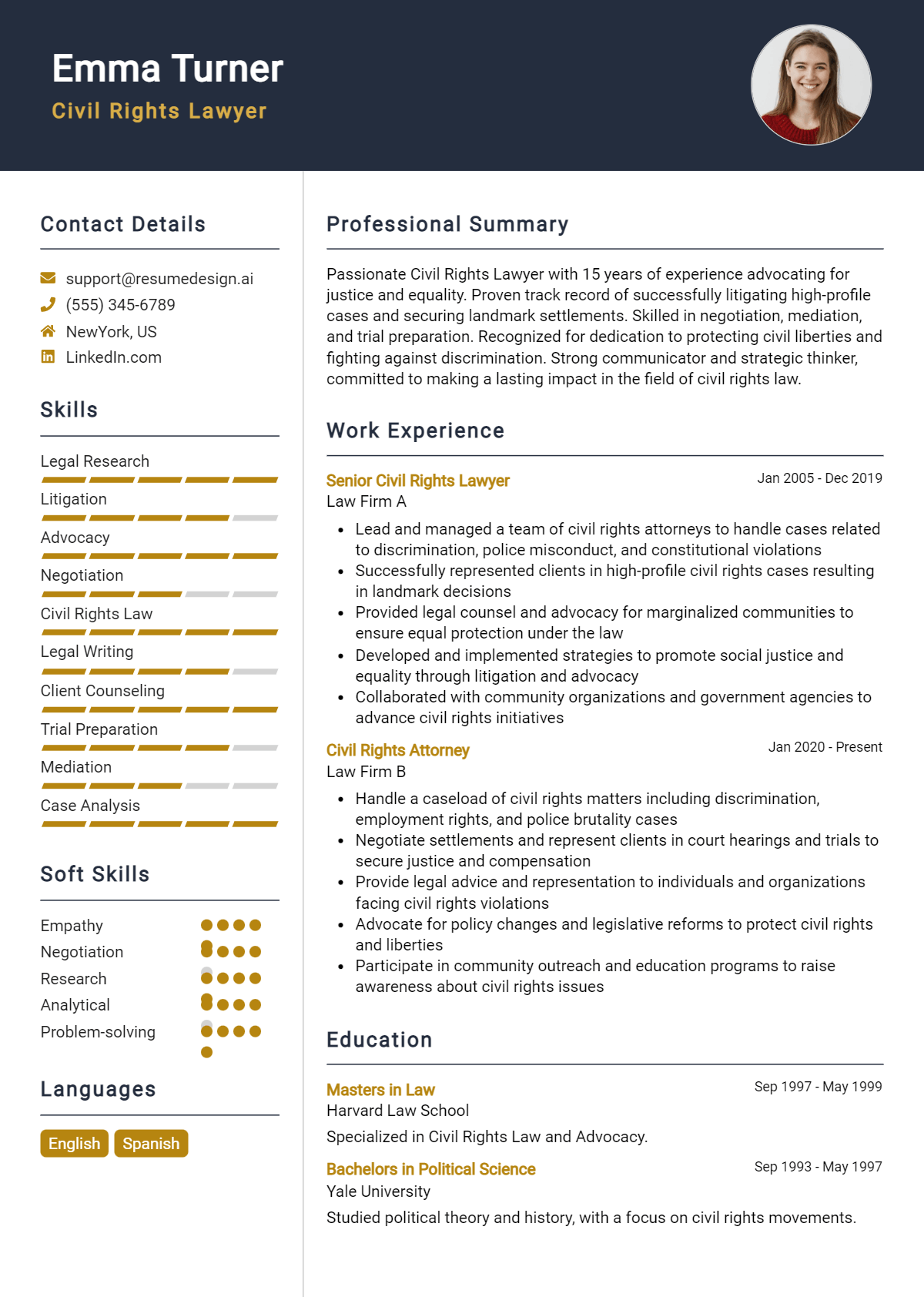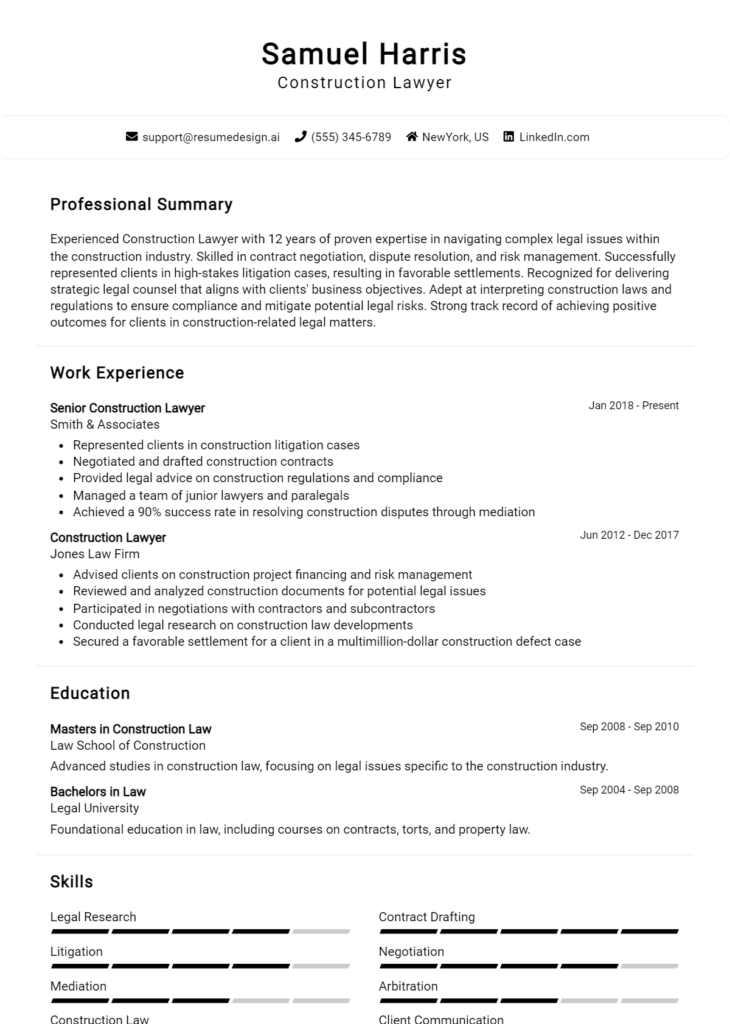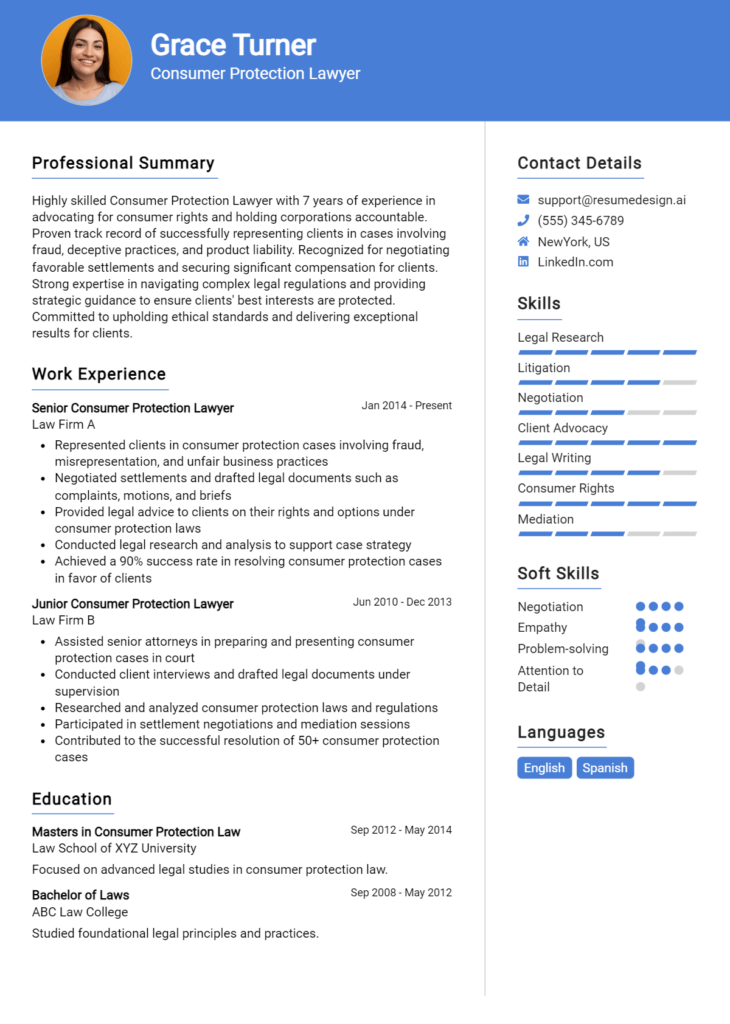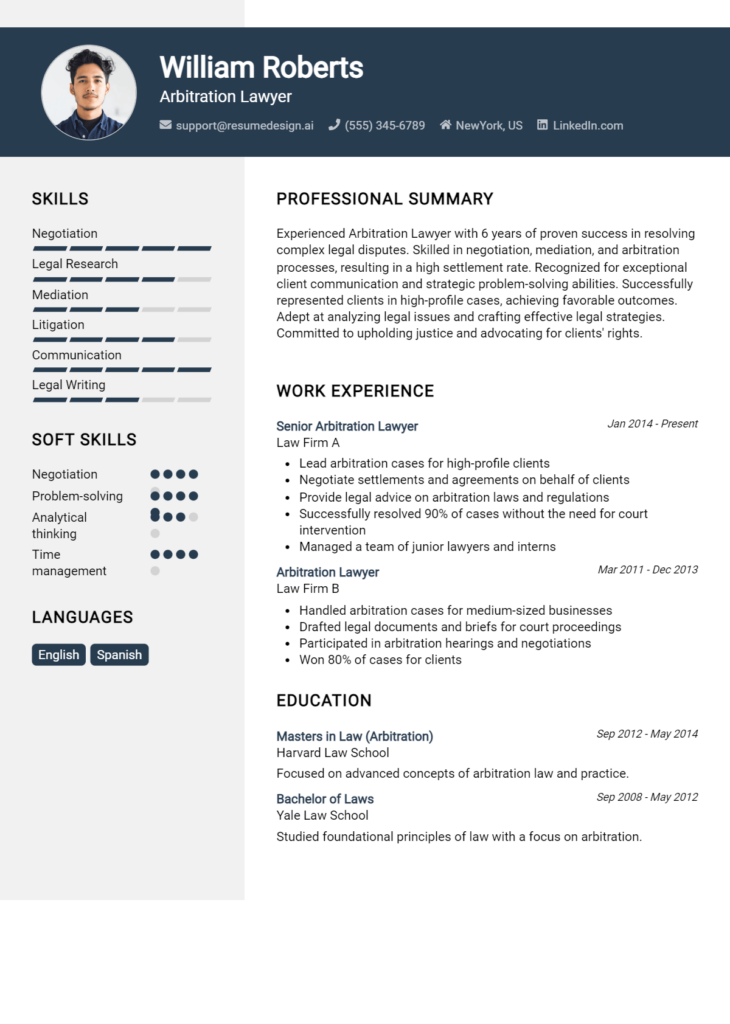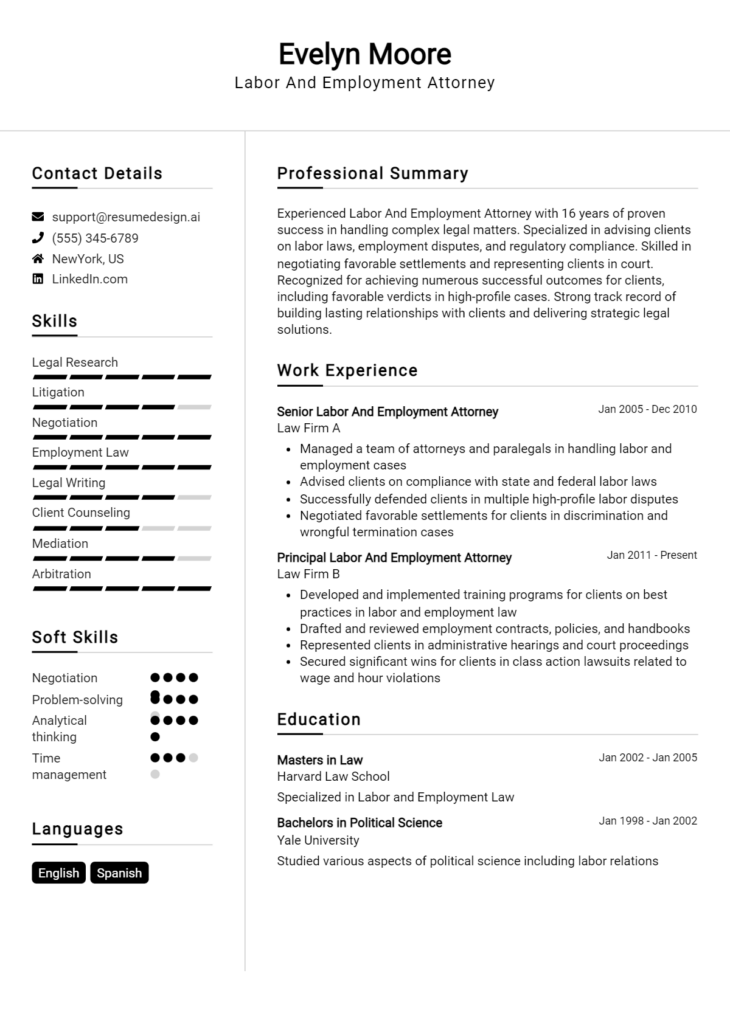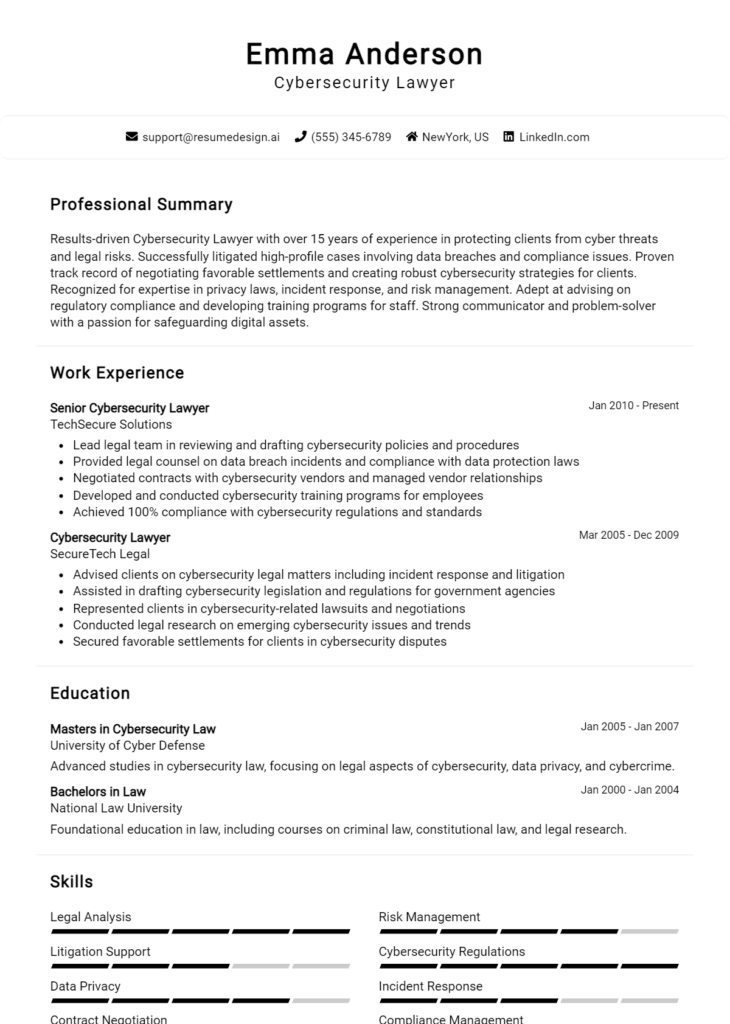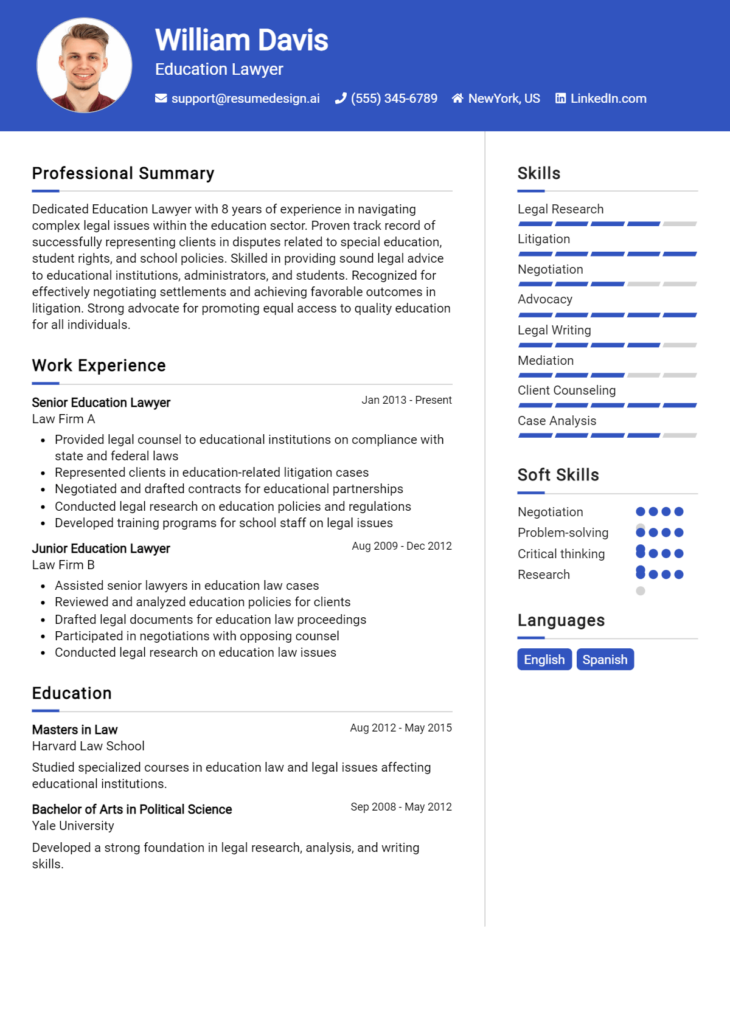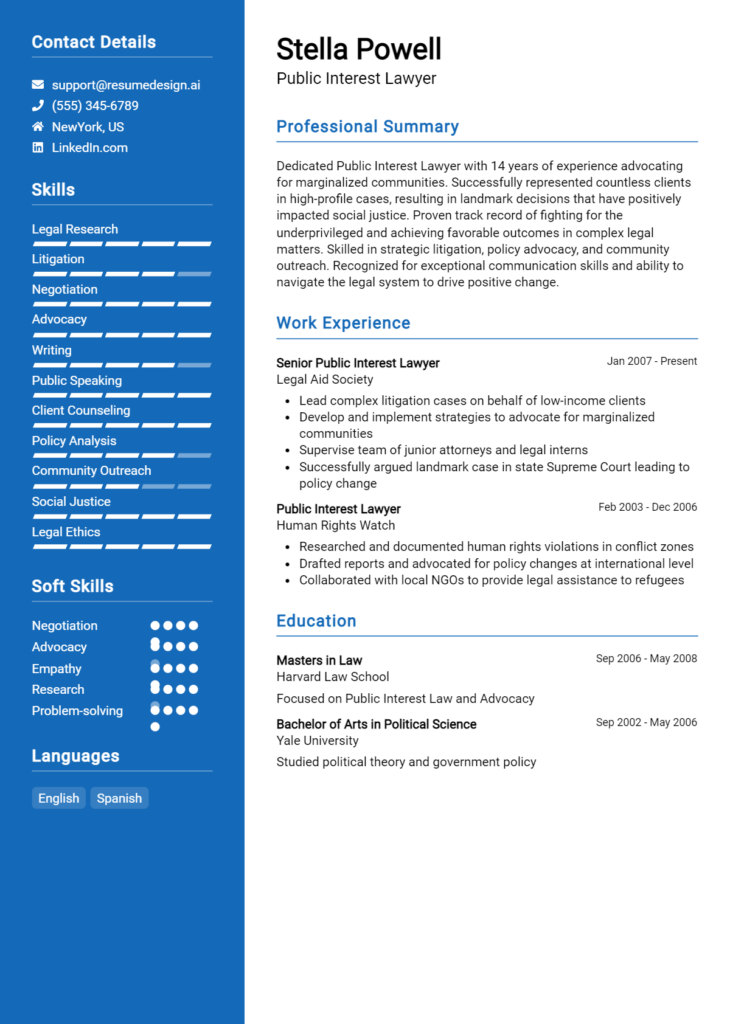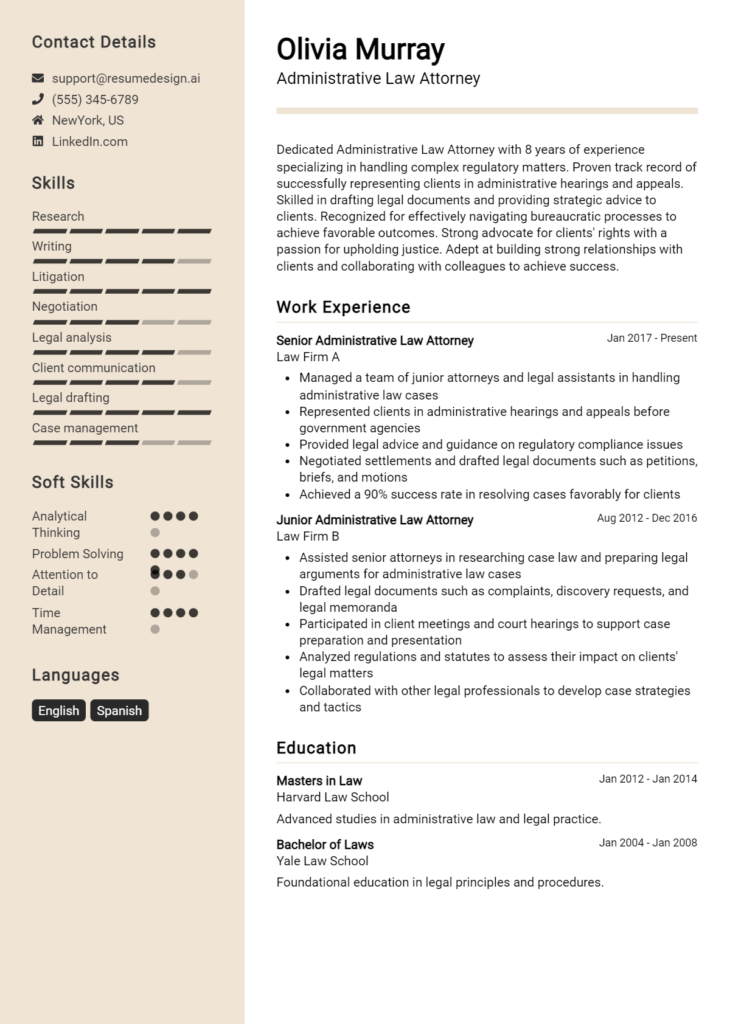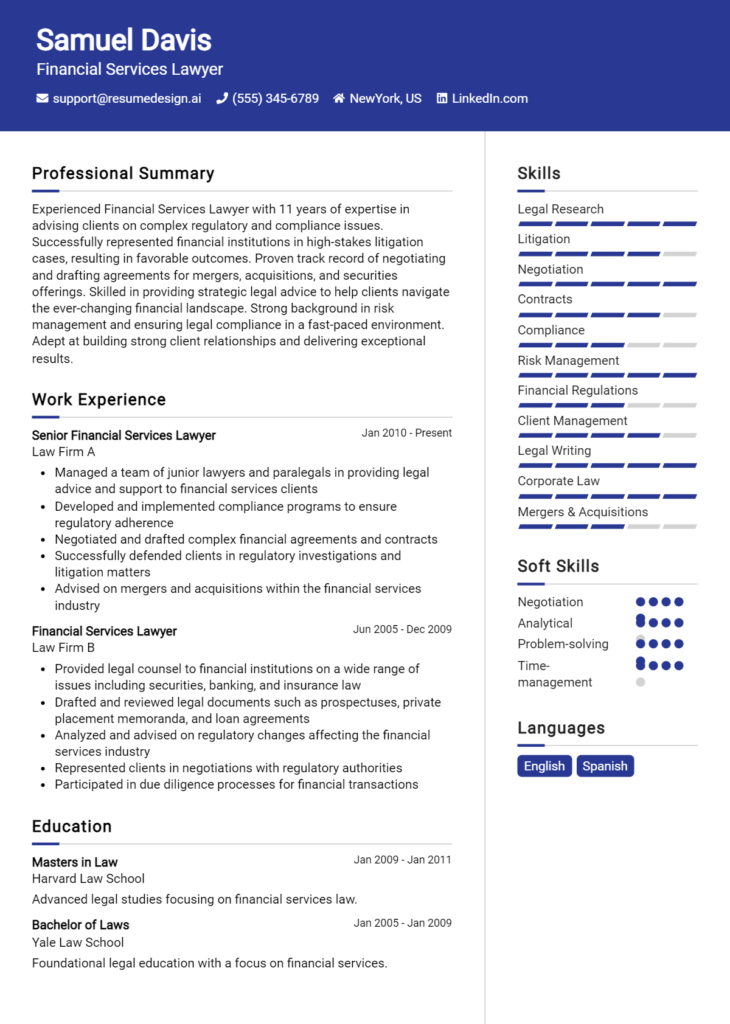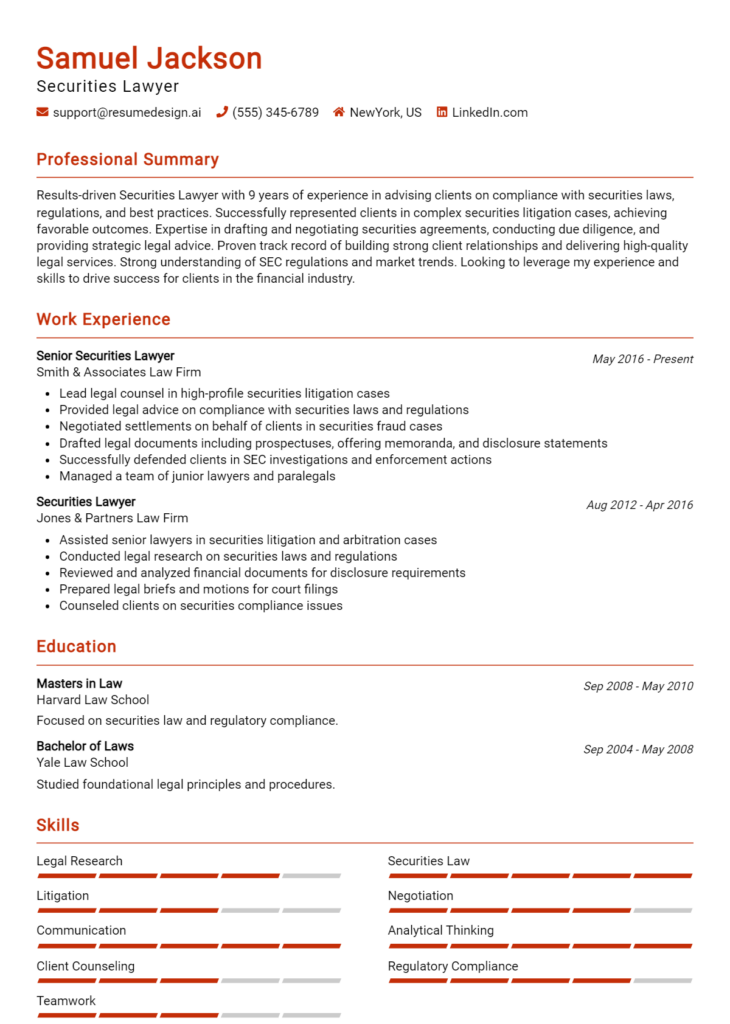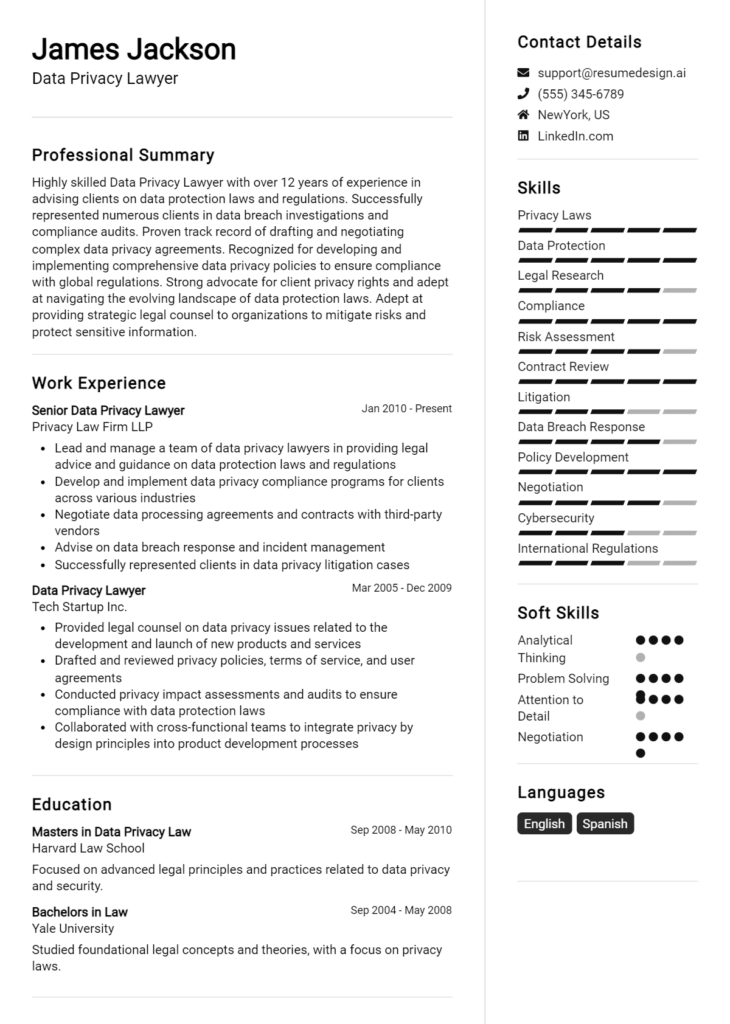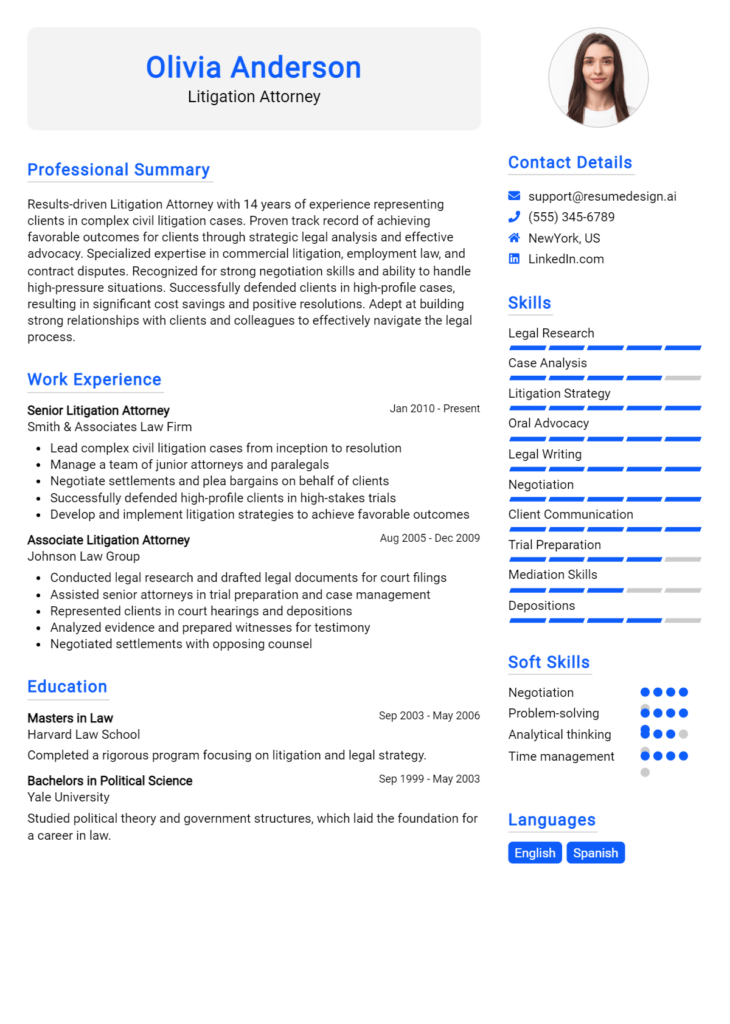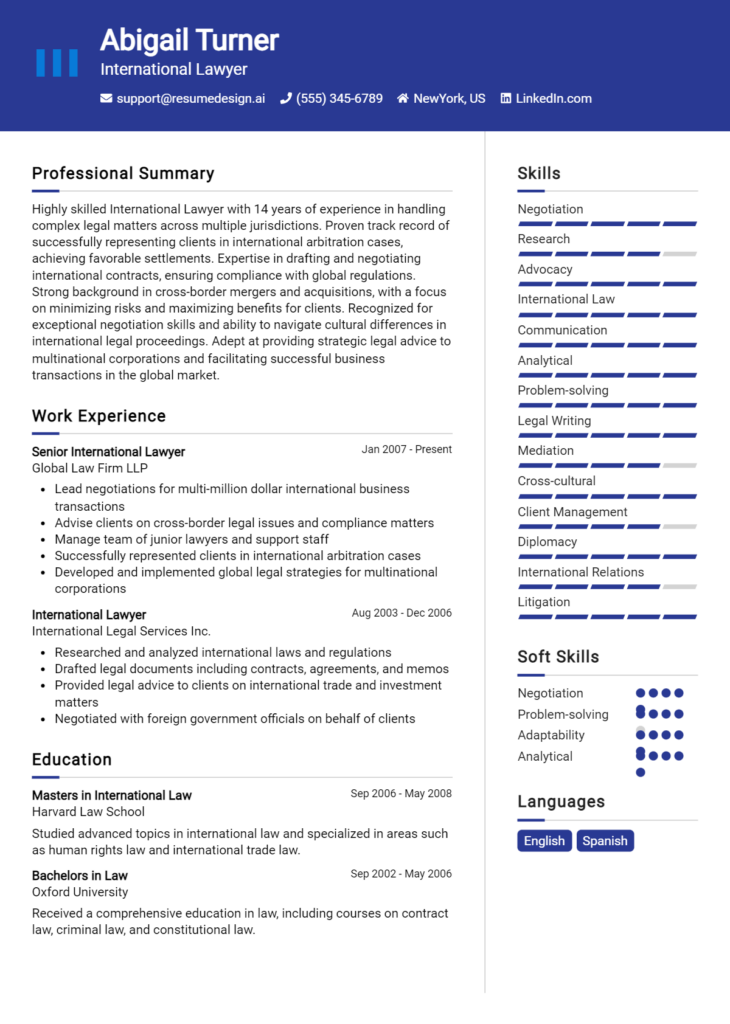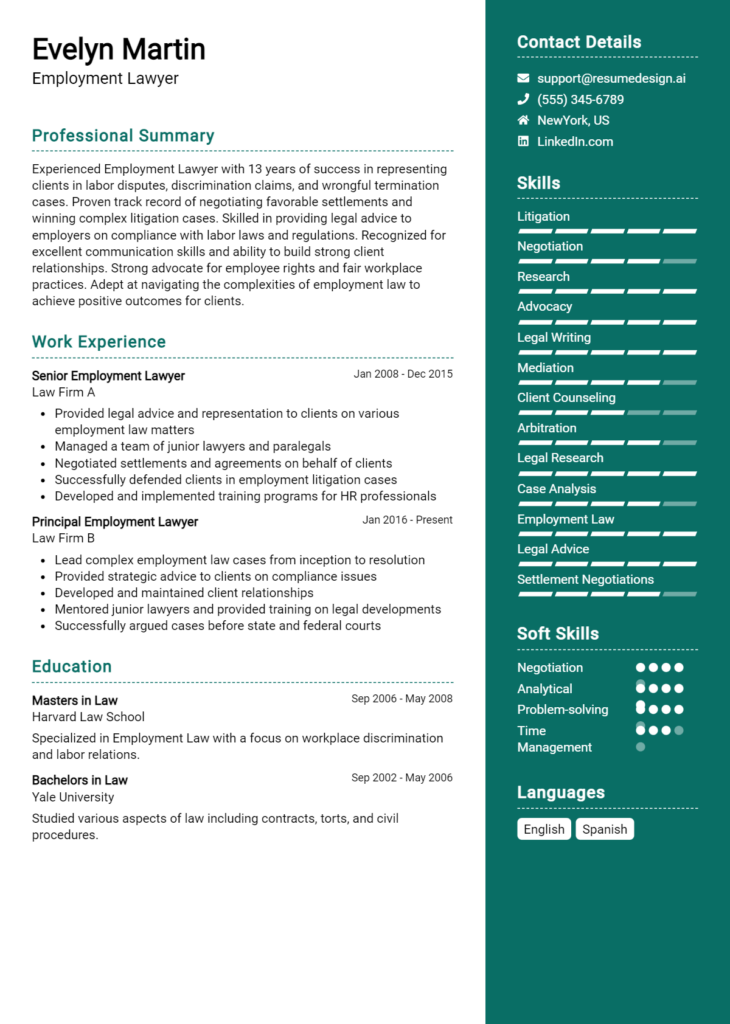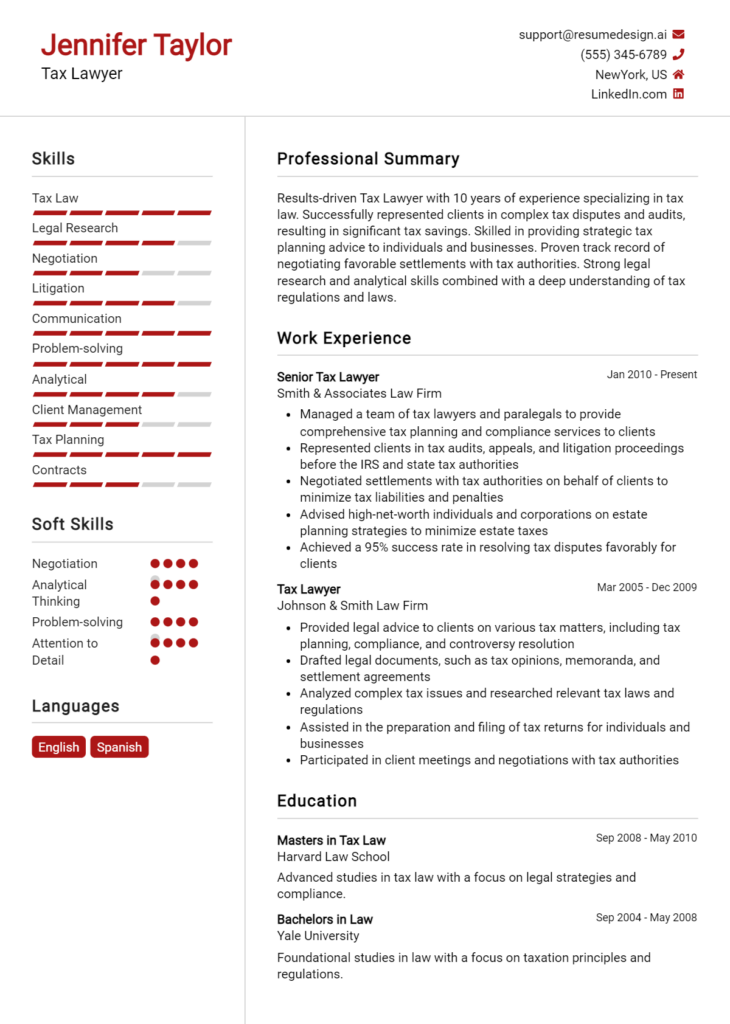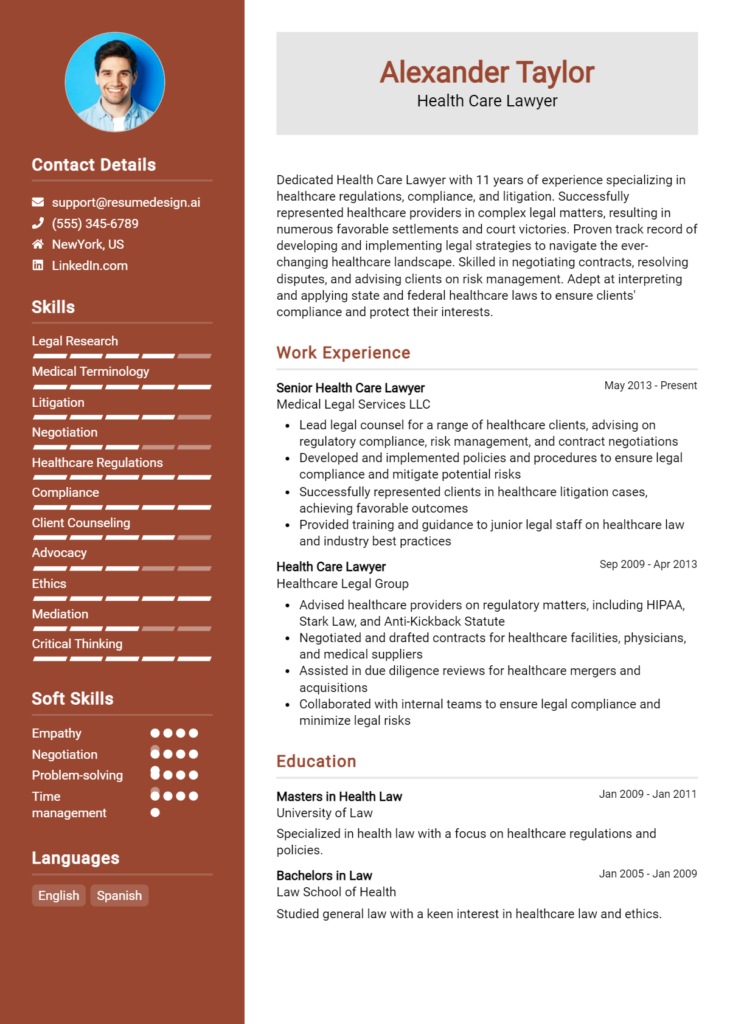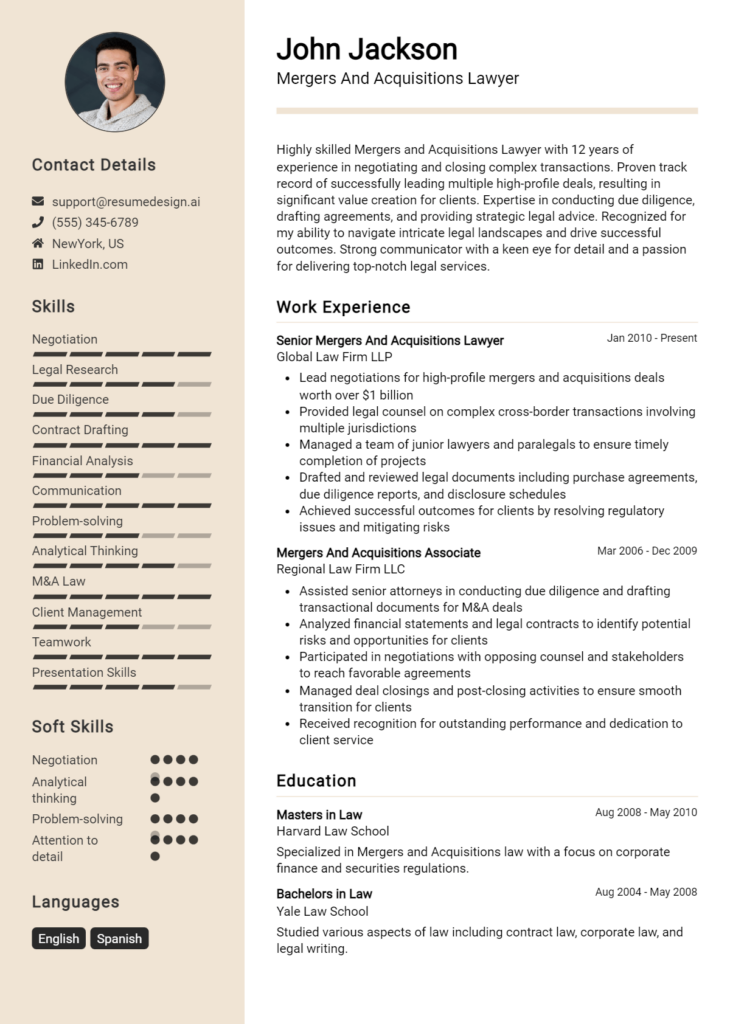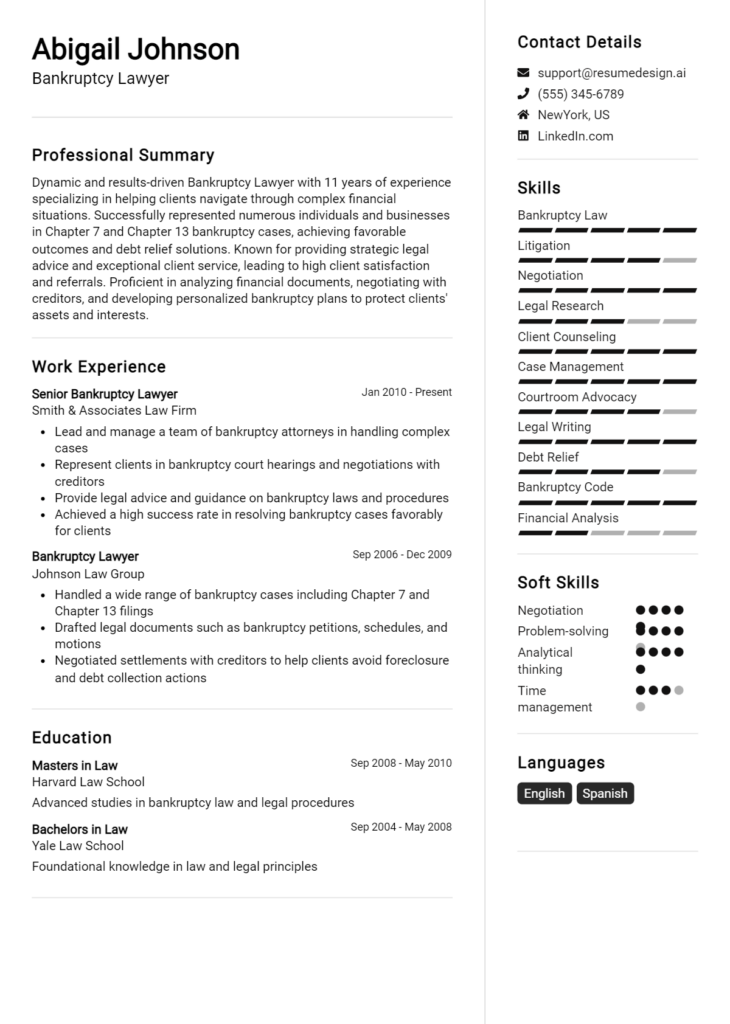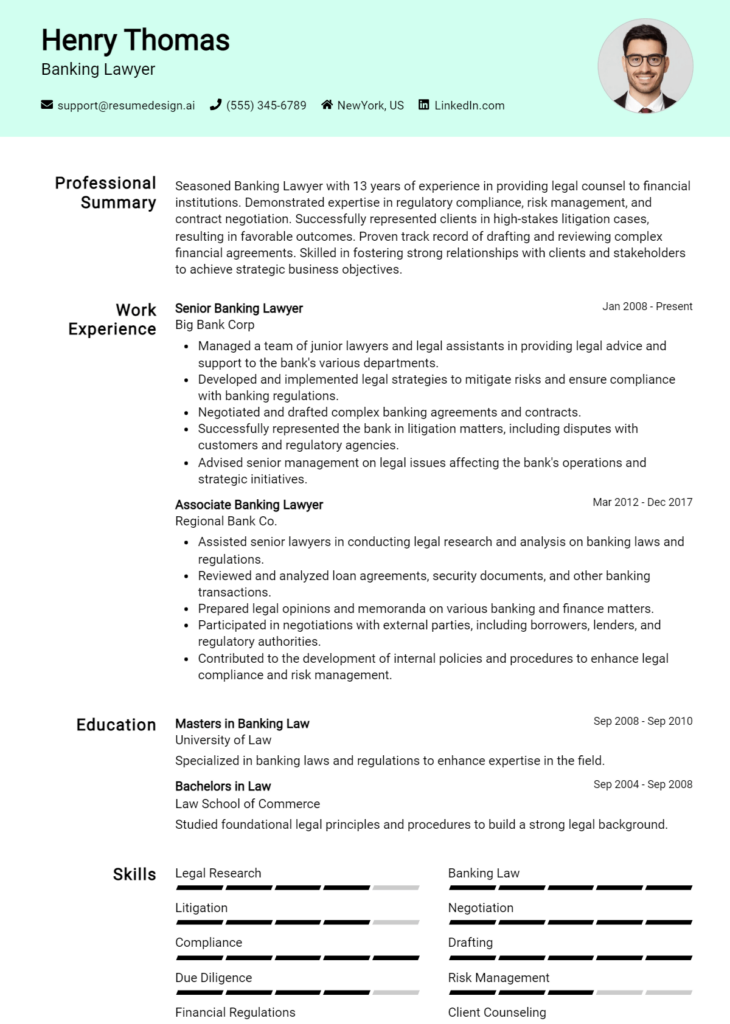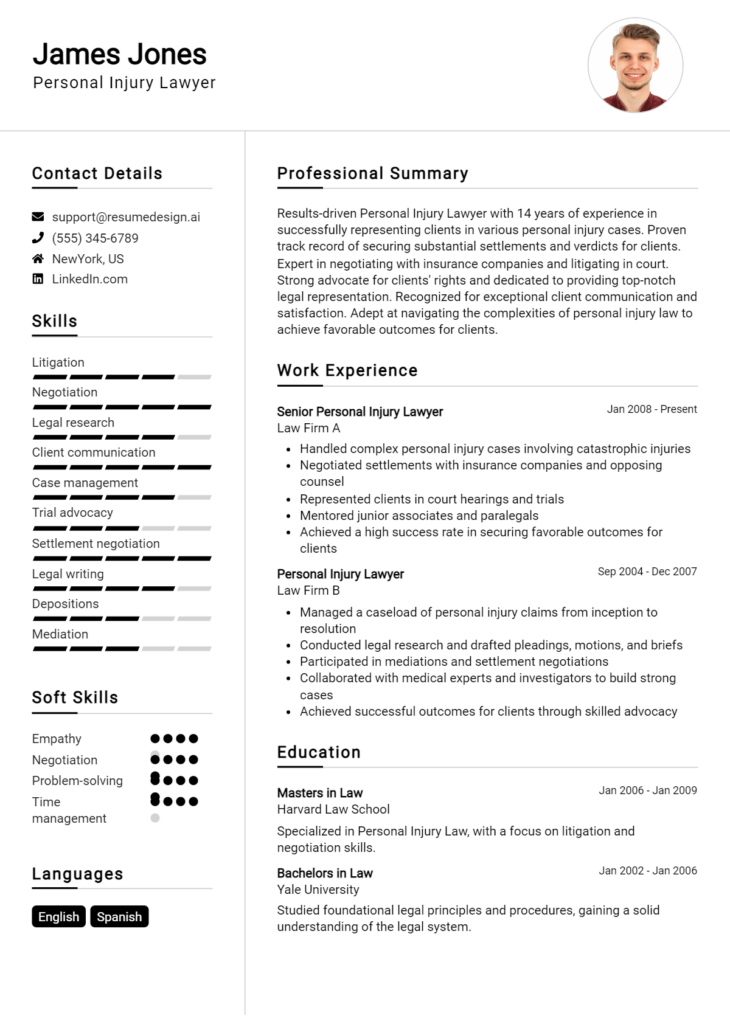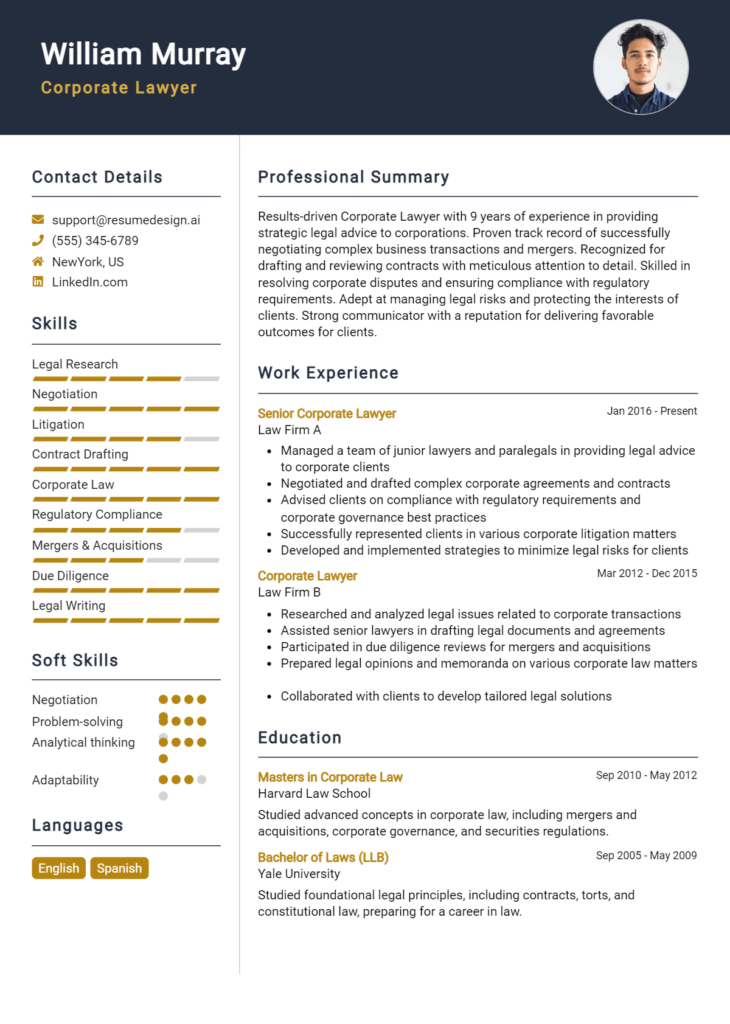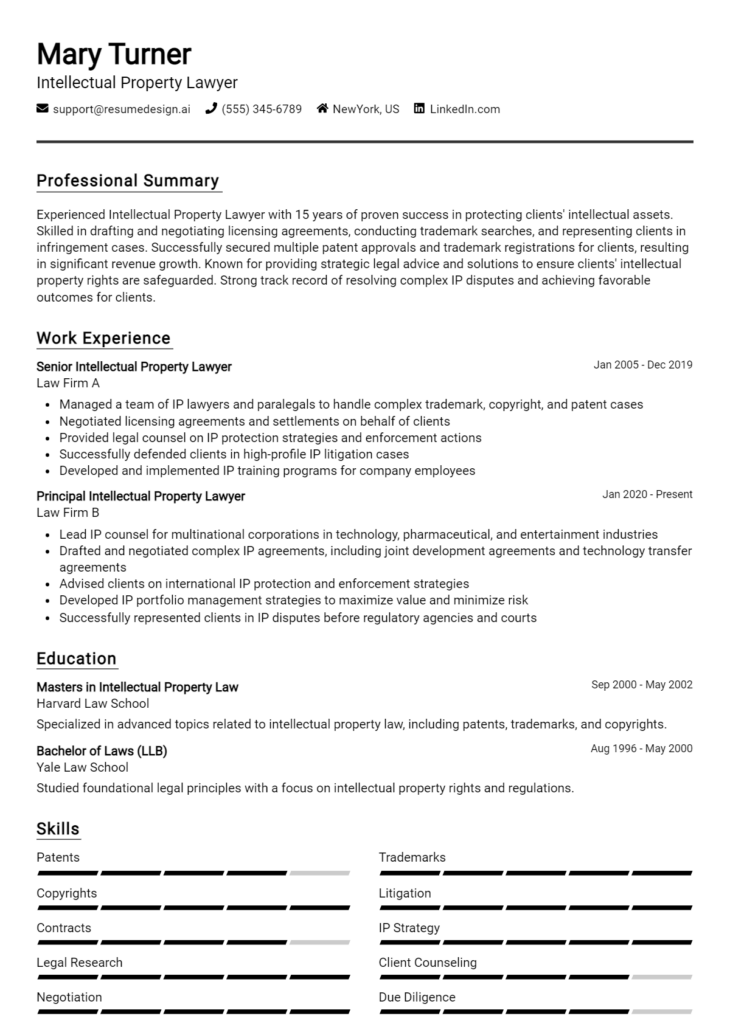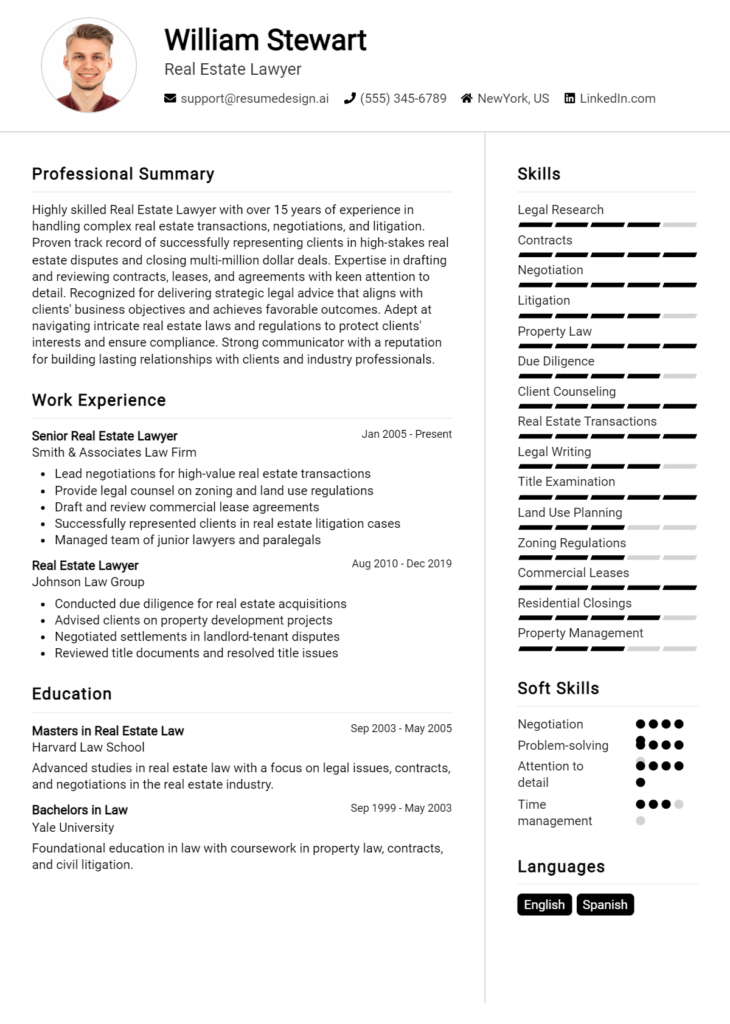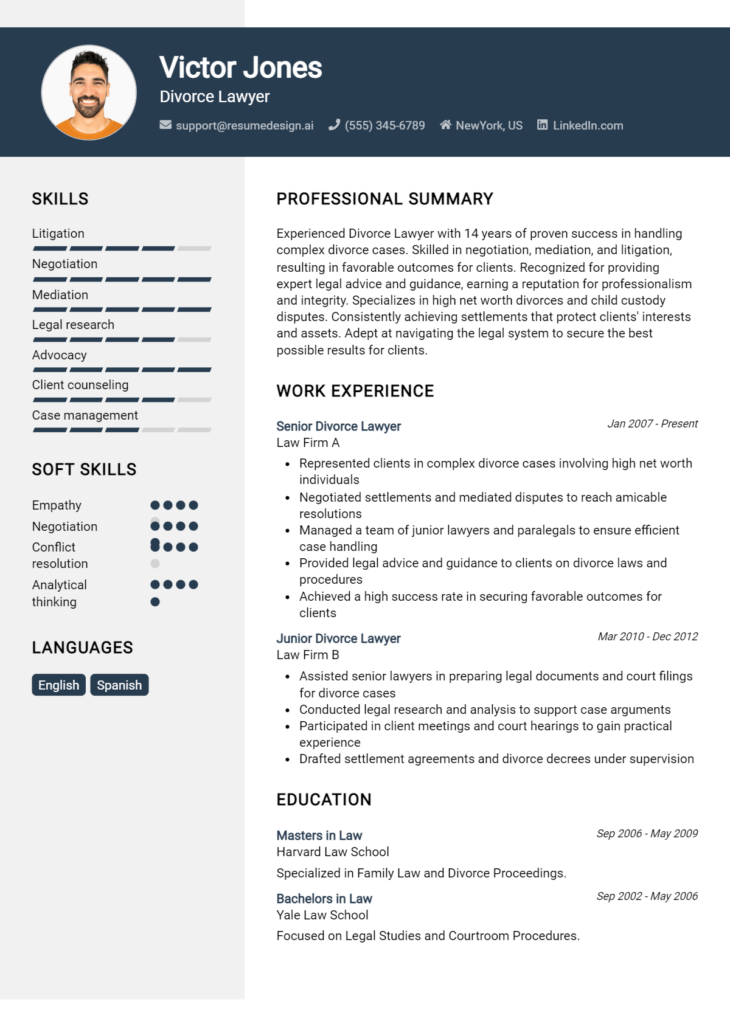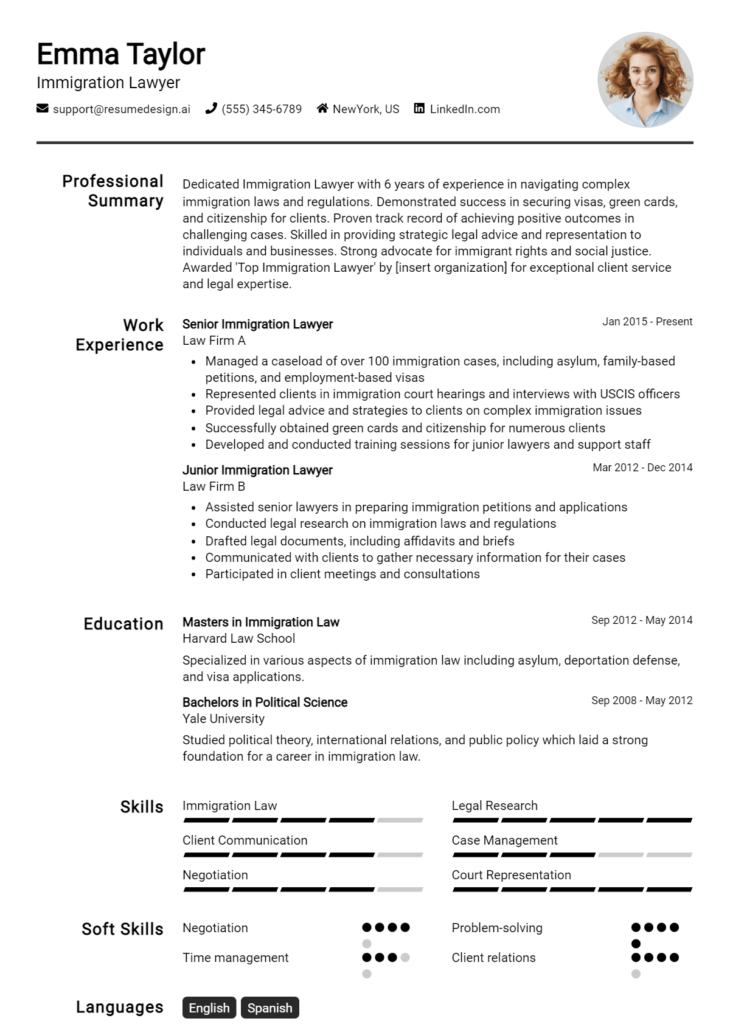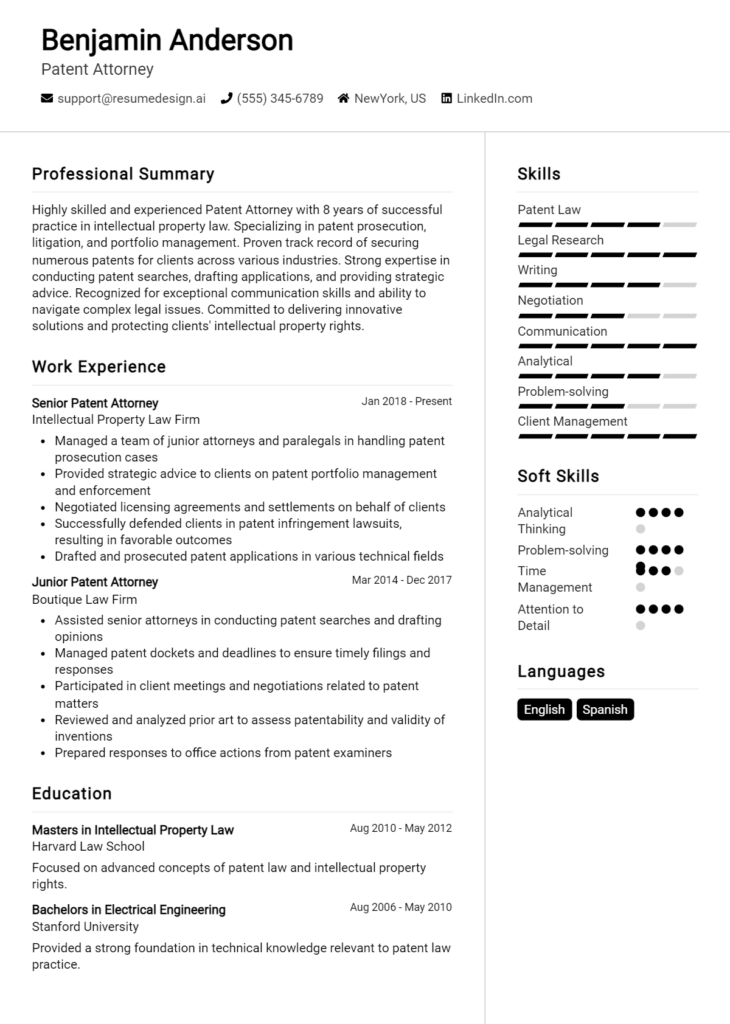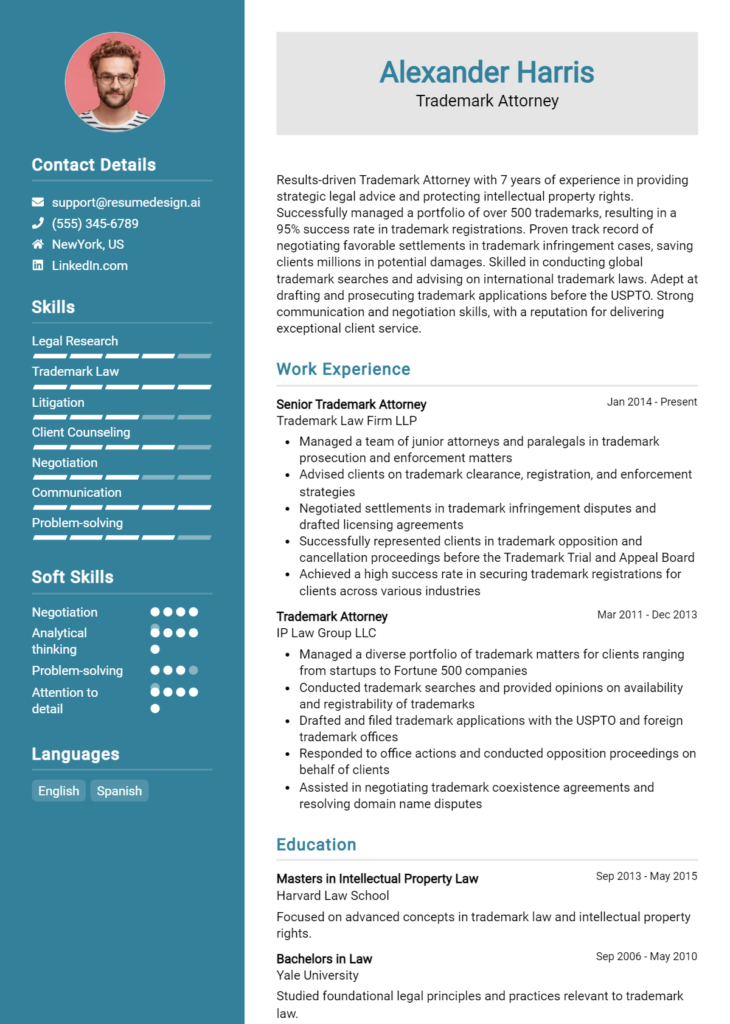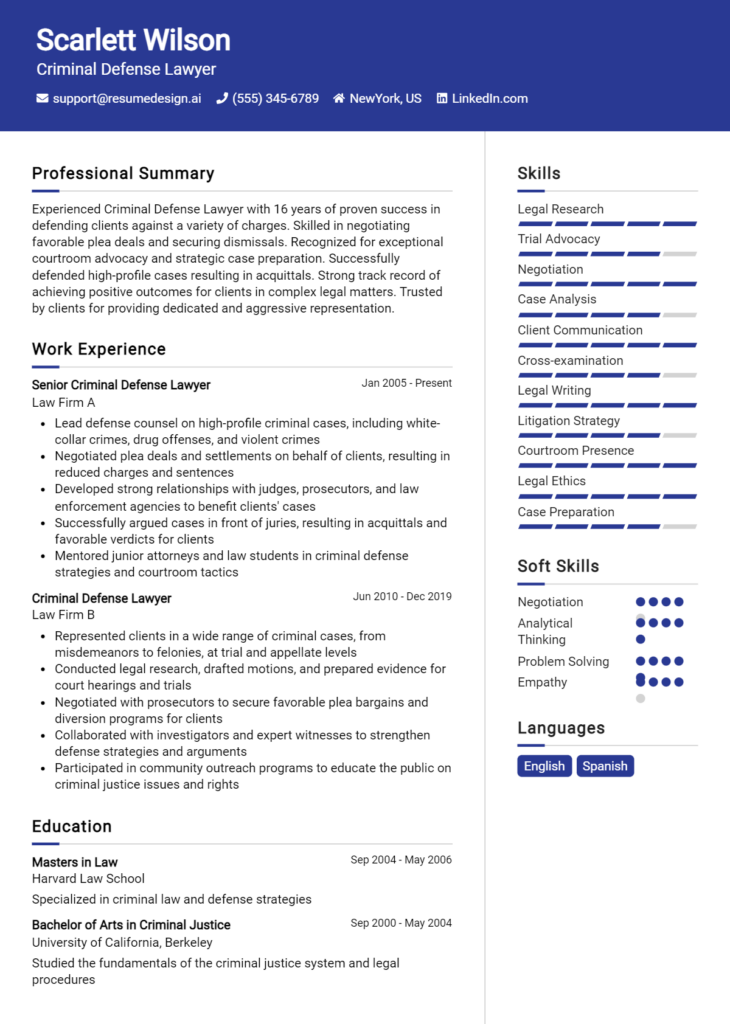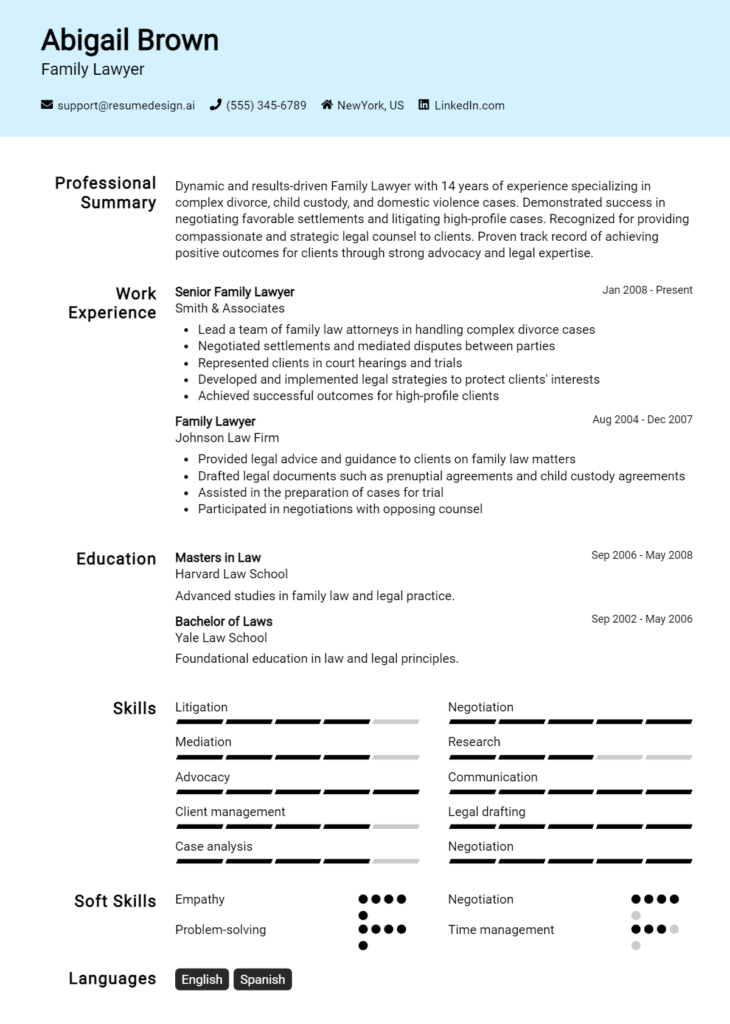Civil Rights Lawyer Core Responsibilities
A Civil Rights Lawyer plays a crucial role in advocating for justice and equality, representing clients whose rights have been violated. Key responsibilities include conducting thorough legal research, drafting legal documents, and representing clients in court. They must possess strong analytical, communication, and negotiation skills to effectively bridge the gap between legal, social, and political departments. Problem-solving abilities are essential for navigating complex cases, which contribute to the organization's mission of promoting civil rights. A well-structured resume that highlights these qualifications is vital for showcasing expertise and enhancing career opportunities.
Common Responsibilities Listed on Civil Rights Lawyer Resume
- Conduct legal research on civil rights laws and regulations.
- Advocate for clients in court and administrative hearings.
- Draft and file legal documents, including complaints and motions.
- Provide legal counsel to clients regarding their rights and options.
- Negotiate settlements and plea deals on behalf of clients.
- Collaborate with community organizations to promote civil rights awareness.
- Analyze evidence and case law to build strong legal arguments.
- Prepare for trials by organizing case files and witness testimonies.
- Stay updated on changes in civil rights legislation and case law.
- Participate in public outreach and education regarding civil rights issues.
- Maintain detailed records of case progress and client communications.
High-Level Resume Tips for Civil Rights Lawyer Professionals
In the competitive field of civil rights law, a well-crafted resume is essential for making a powerful first impression on potential employers. Your resume serves as a reflection of your professional journey, showcasing not only your legal expertise but also your commitment to advocating for justice and equality. It needs to effectively convey your skills, accomplishments, and passion for civil rights work. This guide will provide practical and actionable resume tips specifically tailored for Civil Rights Lawyer professionals, helping you to present yourself as the ideal candidate for this impactful role.
Top Resume Tips for Civil Rights Lawyer Professionals
- Tailor your resume for each application by aligning your experience and skills with the specific requirements outlined in the job description.
- Highlight relevant legal experience, including internships, clerkships, or volunteer work, that demonstrates your commitment to civil rights.
- Quantify your achievements whenever possible; for example, include the number of cases won, clients represented, or legislation influenced.
- Showcase your understanding of civil rights laws and regulations, as well as any specialized training or certifications you have received.
- Incorporate keywords from the job posting to optimize your resume for applicant tracking systems used by many law firms.
- Emphasize your advocacy skills, including public speaking, negotiation, and mediation, which are critical in the civil rights arena.
- Include any relevant publications, presentations, or speaking engagements that demonstrate your thought leadership in civil rights issues.
- Keep your resume concise and focused, ideally one page, ensuring it is easy to read and visually appealing.
- Utilize a clear and professional format, using bullet points and headings to organize information effectively.
- Proofread thoroughly to eliminate any errors, as attention to detail is crucial in the legal profession.
By implementing these tips, you can significantly enhance your chances of landing a job in the Civil Rights Lawyer field. A resume that effectively showcases your relevant skills, accomplishments, and passion for civil rights will help you stand out among other candidates, ultimately leading to more interviews and opportunities in this vital area of law.
Why Resume Headlines & Titles are Important for Civil Rights Lawyer
In the competitive field of civil rights law, a resume's headline or title serves as a critical first impression for hiring managers. A strong headline not only grabs attention but also succinctly summarizes a candidate's key qualifications in a powerful phrase. It sets the tone for the entire resume, providing a clear indication of the applicant’s expertise and focus within civil rights law. A well-crafted headline should be concise, relevant, and directly related to the position being applied for, ensuring that it resonates with the specific needs of the employer.
Best Practices for Crafting Resume Headlines for Civil Rights Lawyer
- Be concise: Aim for a headline that is clear and to the point, ideally no more than a single sentence.
- Focus on relevancy: Tailor the headline to align with the specific civil rights law role you are applying for.
- Highlight key skills: Incorporate strong keywords that reflect your most relevant skills and experiences.
- Use action-oriented language: Choose dynamic verbs to convey your proactive approach and commitment to civil rights.
- Showcase unique qualifications: Mention any specialized training, certifications, or notable achievements that set you apart.
- Keep it professional: Maintain a formal tone appropriate for the legal field, avoiding casual language.
- Test for impact: Ask yourself if the headline would make you want to read further; if not, revise it.
- Consider the job description: Use insights from the job posting to align your headline with the employer's priorities.
Example Resume Headlines for Civil Rights Lawyer
Strong Resume Headlines
Passionate Civil Rights Attorney with 10+ Years of Advocacy for Marginalized Communities
Experienced Legal Advocate Specializing in Social Justice and Equal Opportunity Cases
Results-Driven Civil Rights Lawyer Focused on Policy Reform and Litigation Excellence
Weak Resume Headlines
Lawyer Looking for Work
Civil Rights Professional
The strong headlines effectively communicate the candidate’s specific strengths and area of expertise, making them compelling and relevant to potential employers. They highlight key accomplishments and a passionate commitment to civil rights, which can pique the interest of hiring managers. In contrast, the weak headlines lack detail and specificity, failing to convey any unique qualifications or urgency. This generic approach does not stand out in a competitive job market, making it difficult for candidates to make a memorable impression.
Writing an Exceptional Civil Rights Lawyer Resume Summary
In the competitive field of civil rights law, a well-crafted resume summary is crucial for making a strong first impression on hiring managers. This brief section serves as a powerful opportunity to capture attention quickly, highlighting the candidate's most relevant skills, experiences, and accomplishments that align with the job role. An exceptional summary should be concise yet impactful, tailored to the specific position being applied for, ensuring that it resonates with the values and needs of the organization. By articulating the candidate's commitment to civil rights and their legal expertise, the summary can set the tone for the rest of the resume and encourage further review by potential employers.
Best Practices for Writing a Civil Rights Lawyer Resume Summary
- Quantify achievements: Use specific numbers to demonstrate the impact of your work, such as cases won or clients served.
- Focus on relevant skills: Highlight legal skills that are particularly pertinent to civil rights law, such as negotiation, litigation, and advocacy.
- Tailor for the job description: Customize your summary to reflect the requirements and language used in the job posting.
- Use action verbs: Start sentences with strong action verbs to convey confidence and proactivity.
- Keep it concise: Aim for 3-5 sentences that deliver your message clearly without unnecessary detail.
- Showcase passion: Convey your commitment to civil rights and social justice, which is essential for this role.
- Include relevant certifications: Mention any specialized training or certifications that enhance your qualifications.
- Highlight collaborative experience: Emphasize teamwork and collaboration with other legal professionals or organizations in civil rights efforts.
Example Civil Rights Lawyer Resume Summaries
Strong Resume Summaries
Dedicated civil rights lawyer with over 8 years of experience advocating for marginalized communities, successfully winning 95% of cases handled, including landmark rulings that expanded access to education for underprivileged youth.
Results-driven attorney specializing in discrimination and civil liberties, recognized for reducing client litigation costs by 30% through effective negotiation and mediation strategies, while maintaining a 100% satisfaction rate among clients.
Accomplished civil rights advocate with extensive experience in federal court, having represented over 200 clients in civil rights violations, resulting in $1.5 million in settlements and significant policy changes within local law enforcement agencies.
Weak Resume Summaries
I am a lawyer who cares about civil rights and has worked on various cases.
Experienced attorney looking for a job in civil rights law. I have done some important work in the field.
The examples provided illustrate the key differences between strong and weak resume summaries. Strong summaries are specific, quantifiable, and clearly relate to the field of civil rights law, showcasing measurable successes and relevant skills. In contrast, the weak summaries lack detail, fail to demonstrate any significant achievements, and come across as generic, which can fail to engage hiring managers and diminish the candidate's chances of securing an interview.
Work Experience Section for Civil Rights Lawyer Resume
The work experience section of a Civil Rights Lawyer resume is vital for demonstrating the candidate's capabilities in the legal field, particularly in advocating for justice and equality. This section showcases not only the technical skills acquired through various roles but also the applicant's ability to manage teams and deliver high-quality legal products. By quantifying achievements and aligning experiences with industry standards, candidates can effectively highlight their contributions to civil rights initiatives, making a compelling case for their expertise in the field.
Best Practices for Civil Rights Lawyer Work Experience
- Focus on legal expertise and specific areas of civil rights law, such as discrimination, human rights, or public policy.
- Quantify achievements, such as the number of cases won or settlements reached.
- Highlight leadership roles in managing case teams or collaborating with other legal professionals.
- Include relevant certifications or training that bolster technical skills.
- Emphasize collaboration with community organizations or advocacy groups.
- Demonstrate the impact of your work on clients and communities.
- Use action verbs to convey a sense of dynamism and initiative.
- Tailor descriptions to align with the specific requirements of the position being applied for.
Example Work Experiences for Civil Rights Lawyer
Strong Experiences
- Successfully led a team of five lawyers in a landmark civil rights case resulting in a $2 million settlement for victims of discrimination.
- Drafted and implemented a comprehensive legal strategy for a non-profit organization, increasing their case acceptance rate by 40% within one year.
- Collaborated with local advocacy groups to launch a public awareness campaign, improving community engagement in civil rights issues by 60%.
- Managed a pro bono legal clinic, providing free legal services to over 200 underserved clients in a single year.
Weak Experiences
- Worked on several cases involving civil rights issues.
- Assisted with legal documentation for various projects.
- Attended meetings related to civil rights advocacy.
- Performed general legal research for the firm.
The strong experiences listed provide clear, quantifiable outcomes and demonstrate leadership and collaboration within the legal field, showcasing the candidate's direct impact on civil rights advocacy. In contrast, the weak experiences lack specificity and measurable achievements, making it difficult to gauge the candidate's contributions or effectiveness in their roles. By focusing on demonstrable results and impactful work, candidates can significantly enhance their resumes.
Education and Certifications Section for Civil Rights Lawyer Resume
The education and certifications section of a Civil Rights Lawyer resume plays a crucial role in demonstrating the candidate's academic qualifications and commitment to professional development. This section not only highlights the foundational knowledge gained through formal education but also showcases industry-relevant certifications and specialized training that enhance the lawyer's expertise in civil rights law. By detailing relevant coursework and continuous learning efforts, candidates can significantly boost their credibility and align more closely with the requirements of the job role, making them more attractive to potential employers.
Best Practices for Civil Rights Lawyer Education and Certifications
- Prioritize relevant degrees, such as Juris Doctor (JD) from an accredited law school.
- Include certifications that are recognized within the legal community, such as Certified Civil Rights Specialist.
- List specific coursework that pertains to civil rights, social justice, or constitutional law.
- Highlight any continuing legal education (CLE) courses that focus on civil rights issues.
- Emphasize participation in workshops or training programs focused on advocacy and litigation techniques.
- Ensure all credentials are up-to-date and relevant to current laws and practices.
- Use clear, concise language and avoid overly technical jargon unless widely recognized in the field.
- Consider including honors or distinctions earned during educational pursuits that relate to civil rights law.
Example Education and Certifications for Civil Rights Lawyer
Strong Examples
- Juris Doctor (JD), University of California, Berkeley School of Law, 2020
- Certified Civil Rights Specialist, National Association of Civil Rights Lawyers, 2021
- Relevant Coursework: Constitutional Law, Human Rights Law, and Civil Procedure
- Continuing Legal Education (CLE) in Civil Rights Litigation, 2022
Weak Examples
- Bachelor of Arts in History, State University, 2005
- Certification in Basic Mediation Techniques, 2010
- Online Course in Public Speaking, 2018
- High School Diploma, 2001
The strong examples are deemed effective because they directly relate to the qualifications and skills necessary for a Civil Rights Lawyer, showcasing a relevant academic background, recognized certifications, and pertinent coursework. In contrast, the weak examples lack direct relevance to civil rights law, featuring outdated or general qualifications that do not enhance the candidate's appeal for this specialized role.
Top Skills & Keywords for Civil Rights Lawyer Resume
In the competitive field of civil rights law, having the right skills can make all the difference in effectively advocating for justice and equality. A well-crafted resume highlights both hard and soft skills, showcasing a lawyer's ability to navigate complex legal landscapes while also demonstrating empathy and understanding towards clients. Employers often look for a combination of technical knowledge and interpersonal abilities, making it essential for candidates to present a balanced skill set. For lawyers in this field, skills not only reflect competence but also embody the passion and commitment to uphold civil rights for all individuals.
Top Hard & Soft Skills for Civil Rights Lawyer
Soft Skills
- Empathy: Understanding and sharing the feelings of clients.
- Communication: Articulating complex legal concepts clearly to clients and colleagues.
- Negotiation: Facilitating agreements that respect all parties' rights.
- Critical Thinking: Analyzing situations and constructing logical arguments.
- Persuasion: Convincing judges and juries of clients' positions.
- Problem-Solving: Developing strategic solutions for legal challenges.
- Cultural Competence: Navigating diverse backgrounds and perspectives.
- Team Collaboration: Working effectively with other legal professionals and stakeholders.
- Resilience: Staying committed despite setbacks and challenges.
- Attention to Detail: Ensuring accuracy in legal documents and arguments.
Hard Skills
- Legal Research: Proficient in researching case law, statutes, and regulations.
- Litigation: Experience in court proceedings and trial preparation.
- Drafting Legal Documents: Skilled in writing briefs, motions, and other legal papers.
- Familiarity with Civil Rights Laws: Knowledge of laws such as the Civil Rights Act and the Americans with Disabilities Act.
- Case Management: Effectively managing multiple cases and clients.
- Regulatory Compliance: Understanding and ensuring adherence to legal standards.
- Advocacy: Representing clients in legal disputes and public forums.
- Public Speaking: Confidently presenting cases and arguments in court.
- Mediation and Arbitration: Skills in alternative dispute resolution methods.
- Client Counseling: Advising clients on their legal rights and options.
To further enhance your resume, consider exploring more about skills and ensuring your work experience aligns with the demands of the civil rights law sector.
Stand Out with a Winning Civil Rights Lawyer Cover Letter
I am writing to express my interest in the Civil Rights Lawyer position at [Law Firm Name], as advertised on [Job Portal/Website]. With a robust background in civil rights law and a deep commitment to advocating for social justice, I believe I am well-suited to contribute effectively to your esteemed team. My experience working with marginalized communities has not only honed my legal skills but also fueled my passion for fighting against discrimination and injustice in all its forms.
During my tenure at [Previous Law Firm/Organization], I successfully represented clients in numerous civil rights cases, leading to significant legal victories that upheld the principles of equality and justice. I have a proven track record of conducting thorough legal research, drafting compelling briefs, and engaging in effective negotiations to achieve favorable outcomes. My work has involved collaborating with various advocacy groups and community organizations, allowing me to develop a comprehensive understanding of the systemic issues that affect underrepresented populations.
I am particularly drawn to [Law Firm Name] because of your commitment to [specific aspect of the firm’s mission or notable case], and I am eager to bring my unique perspective and expertise to your firm. I am confident that my dedication to civil rights and my legal acumen will make a meaningful contribution to your ongoing efforts in promoting justice and equality. I look forward to the opportunity to discuss how I can further your mission and support your clients in their pursuit of civil rights. Thank you for considering my application.
Common Mistakes to Avoid in a Civil Rights Lawyer Resume
Crafting an effective resume as a Civil Rights Lawyer is crucial for standing out in a competitive field. However, many applicants make common mistakes that can hinder their chances of securing an interview. By avoiding these pitfalls, you can present a polished and professional image that highlights your qualifications and passion for civil rights work. Here are some of the most frequent errors to watch out for:
Generic Objective Statements: Using a one-size-fits-all objective can make your resume feel impersonal. Tailor your objective to reflect your specific interest in civil rights law and the position you’re applying for.
Lack of Specificity: Vague descriptions of your experiences can leave hiring managers confused about your qualifications. Be specific about your roles, achievements, and the impact of your work in civil rights cases.
Omitting Relevant Experience: Failing to include internships, volunteer work, or pro bono cases related to civil rights can be a missed opportunity to showcase your commitment and relevant skills.
Ignoring Keywords: Many organizations use applicant tracking systems (ATS) to screen resumes. Not incorporating relevant keywords from the job description can result in your resume being overlooked.
Overly Complex Language: Using legal jargon or overly complex language can alienate those reviewing your resume. Strive for clarity and conciseness, ensuring that your qualifications are easily understood.
Neglecting Professional Formatting: A cluttered or unprofessional format can detract from your content. Use a clean, organized layout with clear headings and bullet points for easy readability.
Forgetting to Highlight Soft Skills: While legal knowledge is essential, civil rights law often requires strong interpersonal skills. Failing to mention attributes like empathy, negotiation, and communication can weaken your application.
Not Including Continuing Education: Civil rights law is an ever-evolving field. Omitting relevant continuing education or training can suggest a lack of commitment to staying current in your practice area.
Conclusion
As we conclude our exploration of the essential qualities and skills necessary for a successful career as a Civil Rights Lawyer, it is clear that expertise in legal knowledge, advocacy, and communication are paramount. Civil Rights Lawyers must not only be proficient in the law but also passionate about fighting for justice and equality. Their role often involves navigating complex legal issues, representing marginalized communities, and effecting systemic change. As legal landscapes evolve, so too must the professionals within them, necessitating continuous learning and adaptation.
To ensure you stand out in this competitive field, it’s crucial to have a well-crafted resume that highlights your unique qualifications and experiences. Take the time to review and refine your Civil Rights Lawyer resume, ensuring it effectively showcases your skills in advocacy, negotiation, and legal research.
To assist you in this process, consider utilizing various resources available online. For inspiration and guidance, explore resume templates that can help structure your document effectively. If you prefer a more hands-on approach, the resume builder can streamline the creation process, allowing you to focus on content rather than formatting. Additionally, review resume examples to gain insights into how other successful Civil Rights Lawyers present their qualifications. Don’t forget the importance of a compelling introduction; check out the cover letter templates available to complement your resume and strengthen your application.
Now is the time to take action and ensure your resume reflects your commitment to civil rights and your readiness to advocate for justice.

